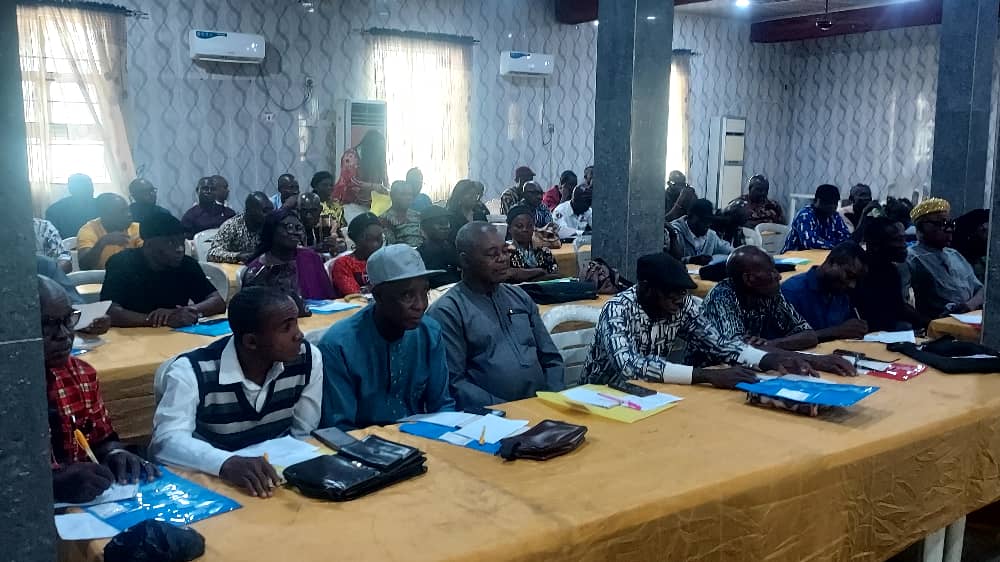Members of Ward Development Committees (WDCs) across Abia State have been called upon to take a frontline role in HIV prevention and grassroots community mobilization, as part of renewed efforts to combat the spread of HIV/AIDS.
The call was made during a sensitization workshop organized by the Abia State Agency for the Control of AIDS (ABSACA) on July 10, 2025, at Gado Hotels, Umuahia. The event brought together community leaders, civil society groups, and health professionals to explore strategies for strengthening the state’s HIV response at the ward level.
Delivering the keynote address, Dr. Uloaku Emma-Ukaegbu, Director-General of ABSACA, described the WDCs as the “backbone” of community-based HIV interventions.

‘WDCs must lead town hall meetings, market outreaches, and faith-based engagements to ensure our people are well-informed about HIV prevention, testing, and treatment,” Dr. Emma-Ukaegbu stated.
She noted that Abia State has made significant progress in reducing HIV prevalence from 5.1% in 2018 to 2.1% in 2024, thanks to collaborative efforts involving four key ministries: Health, Education, Women Affairs, and Youth Development.
“Currently, 50,879 people in Abia are receiving HIV treatment. However, she expressed concern over persistently high infection rates in some LGAs, including Ukwa East (2.48%), Ikwuano (2.38%), and Obingwa (2.29%).
“At the national level, Nigeria recorded 75,000 new HIV infections and 45,000 AIDS-related deaths in 2023, according to the National Agency for the Control of AIDS (NACA). Approximately 1.9 million Nigerians are living with HIV, with about 1.6 million on treatment”, she noted.
Speaking during the workshop, Mr. Chinedu Iroh, Monitoring and Evaluation Officer at ABSACA, emphasized prevention as the cornerstone of HIV control.
Mr. Chinedu emphasized that prevention remains our strongest weapon. We must continue to promote condom use, which not only prevents HIV but also protects against other sexually transmitted infections.
He commended WDC members for their continued efforts and urged them to intensify awareness campaigns and encourage early testing.
Also addressing participants, Mrs. Ekeoma Akidi, the Permanent Secretary in the Ministry of Poverty Alleviation and Social Protection, stressed the importance of involving traditional and religious leaders in HIV advocacy.
Mrs Akdi affirmed that when respected community voices speak openly about HIV, it reduces stigma and encourages people to get tested and seek treatment.
She identified stigma and discrimination as major barriers to HIV control, stressing the need for open, judgment-free discussions.
“People should never be afraid to get tested or treated due to fear of judgment. We must show compassion and normalize conversations around HIV,” she added.
The workshop concluded with WDC members reaffirming their commitment to ramping up sensitization across all wards. Key strategies outlined include:
Door-to-door awareness campaigns and interactive sessions
Free HIV testing in markets, schools, and worship centers
Promotion of the “ABC” strategy, Abstinence, Being faithful, and Condom use.
Education on PrEP (Pre-Exposure Prophylaxis) and PEP (Post-Exposure Prophylaxis) for high-risk individuals.
Mr Isika Peter, a representing from Ibere 1 Ward in Ikwuano LGA, reiterated the role of WDCs in monitoring HIV services and mobilizing communities for better access.
In her closing remarks, Dr. Emma-Ukaegbu issued a strong call to action.
“If we are serious about achieving zero new infections by 2030, then every ward member, every leader, and every family must play a role in this fight.”
She reaffirmed ABSACA’s commitment to community-led initiatives and the integration of HIV response into broader development goals.
With targeted outreach, resilient peer support systems, and united action against stigma, Abia State is firmly on the path to ending HIV within the next few years,” she concluded.

























